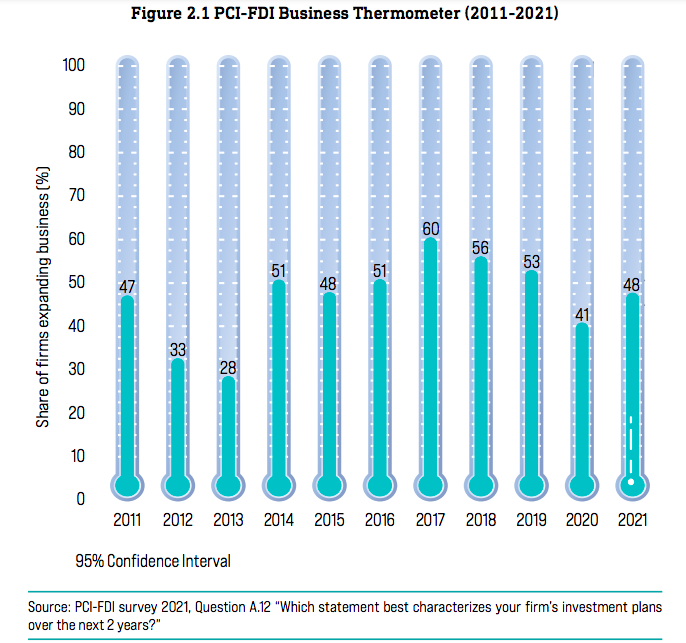Hanoi ranks among Vietnam’s top 10 business-friendly localities
Hanoi has improved the business environment by promoting e-Government and digitalization of administrative procedures.
Hanoi was named among Vietnam’s top 10 business-friendly localities for the fourth consecutive year, ranking 10th out of 63 provinces/cities in the country’s Provincial Competitiveness Index (PCI) 2021 report.
| Hanoi's weighted PCI over the last 5 years. Source: PCI 2021 |
The city, however, dropped one place from 9th in 2020 to 10th in the 2021 report, albeit with a higher score of 68.60 vs 66.93.
“Major economic hubs such as Hanoi and Ho Chi Minh City suffered more severe impacts from the Covid-19 outbreak last year than others. The fact that Hanoi continues to stay in the top 10 nationwide has been a success,” Dau Anh Tuan, director of the Legal Department under the Vietnam Chamber of Commerce and Industry (VCCI) told The Hanoi Times on the sidelines of the PCI 2021 report launching today [April 27].
This is since the overall business environment in Vietnam has improved significantly over the years, as 2021 was the fifth year in a row the average PCI has been above 60 points on the 100-point scale, he said.
The 2021 score landed at 65.3 points, which is 1.6 points higher than the Core Index in 2020 (63.7 points), continuing a general upward trend between 2017 and 2021.
“Hanoi has moved in the right direction in improving the business environment by promoting e-Government and digitalization of administrative procedures, for which I believe the city would bounce back stronger in the coming time,” he added.
Introduced in 2005, the (PCI), the result of a long-standing collaborative effort between VCCI and the US Agency for International Development (USAID), is designed to assess provincial economic governance, the ease of doing business, and administrative reform efforts by provincial governments in Vietnam to boost private sector development.
“The report is an indication of 17 years of continuous efforts to convey objective and candid assessments to promote actions to enhance the business environment at the provincial level,” VCCI Chairman Pham Tan Cong stated at the launch.
In this regard, US Ambassador to Vietnam Marc E. Knapper highlighted the significance of the report by, noting the US Government has partnered with VCCI for the last 17 years to support PCI’s emergence as a premier tool of reference for those seeking to invest in Vietnam.
“This tool has spurred improvements in local economic governance that have unlocked private sector-driven growth,” said Knapper.
The 2021 PCI report was developed from responses by 11,312 firms, including 10,127 domestic private businesses operating in 63 provinces and 1,185 foreign-invested enterprises (FIEs) operating in 22 provinces in Vietnam.
Major cities of Haiphong and Danang and provinces of Quang Ninh, Dong Thap, and Vinh Phuc secured the top five positions in the PCI 2021 rankings, having achieved very positive results in economic development and Covid-19 response policies, as perceived by firms.
Taking a detailed view of the report, Tuan from the VCCI noted administrative procedure reform attained positive results, with increased effect of enforcement across provinces.
Anticorruption efforts are paying off, as firms reported a reduced burden of informal charges, he said.
However, provincial governments should focus more on accelerating the digitalized settlement of administrative requests, and reducing constraints in the tax, land, social insurance, environmental, fire safety, and market regulation procedures, Tuan added.
Registration of conditional business lines is another area of concern, as the compliance burden remains substantial. At the same time, provincial authorities should make further efforts to effectively implement business support programs as well as programs supporting domestic firms in international economic integration, he continued.
Foreign firms remain confident in Vietnam’s prospects
A key aspect of the report was the assessment of foreign business sentiment in Vietnam, which, it said, remained positive about Vietnam’s business landscape.
Edmund Malesky, professor of political economy at Duke University, a research member of the report, noted there has been a lessened inspection burden, alongside relatively positive perceptions in some areas of regulatory compliance.
In addition, informal charges continued to decline and labor and infrastructure quality improved significantly over time.
To remain an attractive destination for foreign investment, Vietnam should put more reform efforts on tax, fire safety, import/export, investment registration, and social insurance procedures, he said.
Meanwhile, Malesky called for more facilitation in the procedures to implement construction investment projects, including the procedures to obtain construction permits, approval of fire prevention; appraisal of environmental impact assessment reports.
He also stressed the necessity for greater efforts to combat corruption in the areas of import-export, inspection, court proceedings, and land administrative procedures. Vietnam should also improve labor quality and continuously improve infrastructure.




![[Longform] Vietnam economy - back to business](https://cdn-media.hanoitimes.vn/2022/03/29/cover_VN_eco_thay.jpg?w=480&h=320&q=100)









